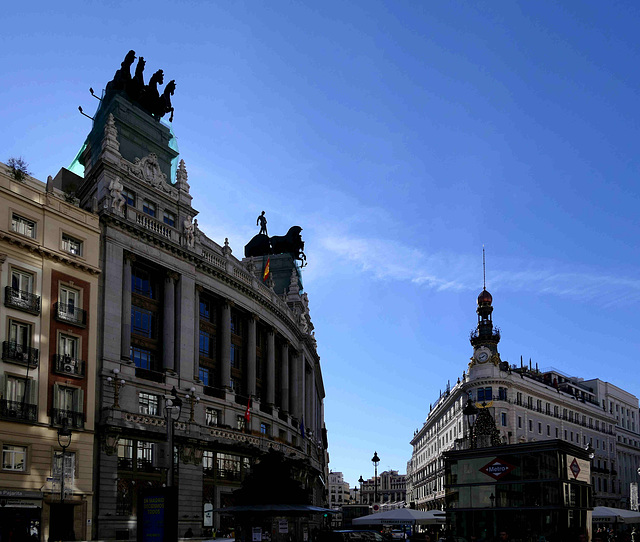Location
Lat, Lng: 40.416619, -3.700454
You can copy the above to your favourite mapping app.
Address: Plaza de Canalejas, 28014, Sol, Madrid, Comunidad de Madrid
You can copy the above to your favourite mapping app.
Address: Plaza de Canalejas, 28014, Sol, Madrid, Comunidad de Madrid
See also...
Keywords
Authorizations, license
-
Visible by: Everyone -
All rights reserved
-
118 visits
Madrid - Plaza de Canalejas


Madrid is the capital and most populous city of Spain. The city has almost 3.4 million inhabitants and a metropolitan area population of approximately 6.7 million. Madrid is part of the historical landscape of Castile and is located in the middle of the Meseta, the plateau of Castile.
The site of modern-day Madrid has been occupied since prehistoric times. The first document about the existence of an established settlement in Madrid dates from the Muslim age. In the second half of the 9th century Umayyad Emir Muhammad I built a fortress here. After the disintegration of the Caliphate of Córdoba in the early 11th century, Madrid was integrated into the Taifa of Toledo. In 1083, Madrid was conquered by the Kingdom of Castile. In 1309, under Fernando IV, the Assembly of Estates (Cortes) of the Kingdom of Castile was convened for the first time in Madrid.
In 1561, Philip II moved the royal court from Valladolid to Madrid. It became the de facto capital of Spain, which it remains to this day. In 1701 the War of the Spanish Succession broke out, which led to the Anglo-Portuguese occupation of the city in 1706. It ended in 1714 with the Bourbons taking over the Spanish throne. Today's royal palace was built under their rule. Particularly during the reign of Charles III, who is therefore popularly referred to as the “best mayor of Madrid”, the city's public infrastructure was modernized and numerous public buildings were built.
Madrid, which is historically and geographically part of "Castilla la Nueva" (New Castile) now is one of the 17 autonomous communities of Spain
The "Plaza de Canalejas" is located in the central district of Madrid. The place is named after the politician José Canalejas (1854-1912), who was assassinated nearby by an anarchist.
The site of modern-day Madrid has been occupied since prehistoric times. The first document about the existence of an established settlement in Madrid dates from the Muslim age. In the second half of the 9th century Umayyad Emir Muhammad I built a fortress here. After the disintegration of the Caliphate of Córdoba in the early 11th century, Madrid was integrated into the Taifa of Toledo. In 1083, Madrid was conquered by the Kingdom of Castile. In 1309, under Fernando IV, the Assembly of Estates (Cortes) of the Kingdom of Castile was convened for the first time in Madrid.
In 1561, Philip II moved the royal court from Valladolid to Madrid. It became the de facto capital of Spain, which it remains to this day. In 1701 the War of the Spanish Succession broke out, which led to the Anglo-Portuguese occupation of the city in 1706. It ended in 1714 with the Bourbons taking over the Spanish throne. Today's royal palace was built under their rule. Particularly during the reign of Charles III, who is therefore popularly referred to as the “best mayor of Madrid”, the city's public infrastructure was modernized and numerous public buildings were built.
Madrid, which is historically and geographically part of "Castilla la Nueva" (New Castile) now is one of the 17 autonomous communities of Spain
The "Plaza de Canalejas" is located in the central district of Madrid. The place is named after the politician José Canalejas (1854-1912), who was assassinated nearby by an anarchist.
kiiti has particularly liked this photo
- Keyboard shortcuts:
Jump to top
RSS feed- Latest comments - Subscribe to the comment feeds of this photo
- ipernity © 2007-2025
- Help & Contact
|
Club news
|
About ipernity
|
History |
ipernity Club & Prices |
Guide of good conduct
Donate | Group guidelines | Privacy policy | Terms of use | Statutes | In memoria -
Facebook
Twitter











Sign-in to write a comment.